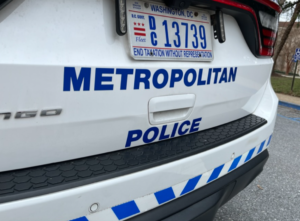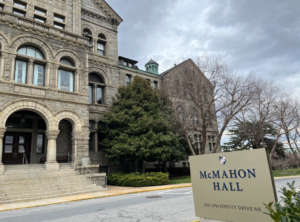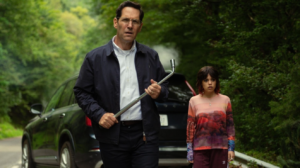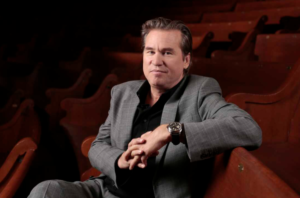University Hosts Third Session of Healing the Breach of Trust
By Katie Ward and Thomas Holmes
The university hosted the third session of the Healing the Breach of Trust series, a day-long event called “What’s Really Going On? The Root Causes of the Current Crisis,” in Heritage Hall on Tuesday, March 26.
About 100 faculty, alumni, and clergy attended the different talks throughout the day. Stephen White, the executive director of the Catholic Project, and Susan Timoney, associate professor in the School of Theology and Religious Studies, made the introductory address to open the event. Timoney advocated for the shaping of an “ecclesial consciousness”, to think with the mind of the Church, an idea inspired by the dialectic of humanity’s human and divine natures. Their address was followed by the first talk with three professors, which addressed the role of “power and clericalism” in the crisis.
The second talk focused on the organizational behavior which had permitted and perpetuated the crisis. Gary Weaver, a management and ethics professor at the University of Delaware, and Michael Edward Brown, a professor of ethical leadership at Penn State University, summarized how the crisis is not just in the individuals but also the organizational structure itself. Weaver mentioned that many survivors don’t report because they aren’t convinced any change will come of it. He attributed this to a “lovely at the top” phenomenon, in which the leaders of the Church do not have problems brought to their attention, the culture of clericalism, which places an inflated reverence on clergy, and a “pattern of institutional secrecy.”
Brown urged the event attendees to take away some main points from the talk: to define the crisis with a broad and complex definition instead of looking for a single definition, to encourage informal changes in addition to new policies in the Church infrastructure, and to support research which will include many perspectives in the conversation. Brown also mentioned that no top-down approach will work— that not just the papacy but every priest and bishop needs to commit to comprehensive change in the Church because they are dedicated to its success.
“Leaders are the ones talking about it, communicating it, reinforcing it, that we’re doing this not just to protect the institution; we’re doing it because it makes us a better institution,” Brown said. “That’s who we want to be and what we stand for, not what we don’t do, it’s not the 10 Commandments, right. It’s the Beatitudes— it’s who we want to be.”
In the third talk, Father Paul Sullins and Dr. Julie H. Rubio presented to a crowd of priests, theologians, social scientists, and concerned parents. The two speakers gave different opinions on the role sexuality and sexual teaching in the church crisis.
Sullins was the first to speak, presenting on his research done in response to the John Jay Report, a study commissioned by the U.S. Conference of Catholic Bishops to investigate “the nature and scope of sexual abuse of minors by Catholic priests and deacons in the United States 1950-2002.”
Sullins’ report aimed to explain the evidence that suggested that priests involved in sexual abuse cases were homosexual. According to the John Jay Report, around 80% of all sexual abuse crimes are committed against females while in the church, nearly 80% of the crimes committed are against young boys. This raises the question of whether or not the priest committing these crimes are a majority homosexual.
The study finds that there was a .96 correlation between the rise of seminary homosexual subcultures and the rise of child sex abuse in America.
Dr. Rubio was the next to present on the relationship between sexual teaching and the sexual abuse crisis in the church. Rubio is a Professor of Theological Studies at Santa Clara University.
Rubio discussed the issue of sexual abuse in the church as a social crisis rather than just a church issue.
“This is a crisis about power and also about sex,” said Rubio regarding the misuse of clerical power over lay people in vulnerable situations.
The last talk was a roundtable discussion of the editors-in-chief of Catholic News Service, National Catholic Register, and America magazine. The panelists spoke about their publications’ initial reactions to the sexual abuse allegations, the immediacy of social media in spreading news, using sources outside of secular media, and the roles and responsibilities of Catholic media in the crisis. They also mentioned the generational difference of younger Catholics feeling more angry and older Catholics generally feeling more dejected, and how the media can accompany the reader with resources.
“Everything needed to remedy the crisis is already in the Church teachings, we need to bring that to light as Catholics,” said Jeanette DeMelo the editor-in-chief of the National Catholic Register.
The seminar was sponsored by the Catholic Project, an initiative of the university to respond to the Church in crisis; its work will “be aimed primarily at addressing issues under the categories of remediation, prevention, and understanding,” according to its newly-launched website.
The Healing the Breach of Trust series aims to “address the proper role of laity in the Church, the factors that led to the sex abuse crisis, and how the laity and the clergy can work together toward renewal”. Previous summits have focused on the role of the laity and the capacity of the press to report on the crisis. The next session, titled “The Way Forward: Principles for Effective Lay Action” will be held on April 25 and will feature speakers from Yale University, Princeton University, and Catholic University, and the Cardinal Daniel DiNardo, Archbishop of Galveston-Houston.







